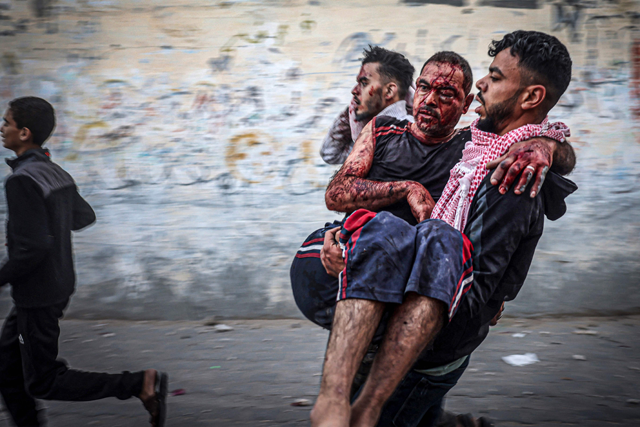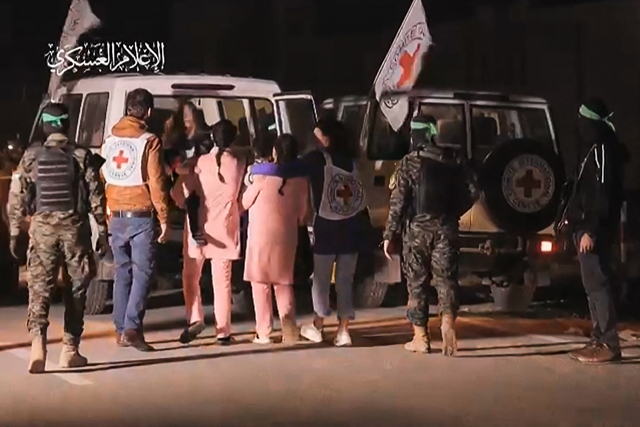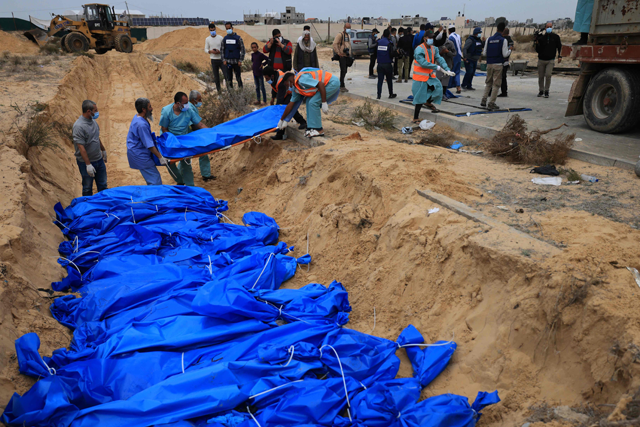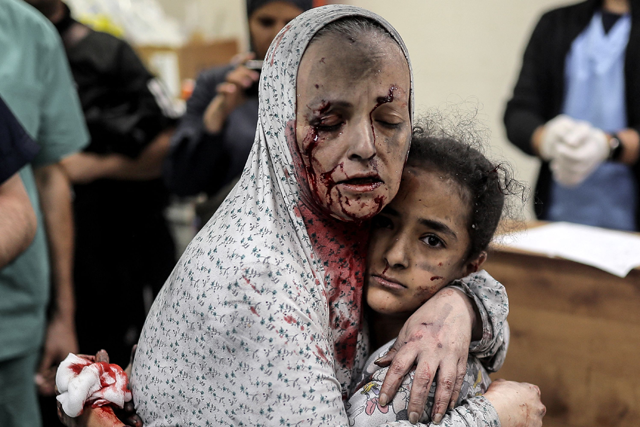You are here
Qatar says Gaza ceasefire, hostage release to start Friday
By AFP - Nov 23,2023 - Last updated at Nov 23,2023

A Palestinian man carries an injured man as people flee following an Israeli strike in Rafah in the southern Gaza on Thursday, amid ongoing Israeli bombardment of the strip (AFP photo)
DOHA — A Gaza truce and hostage release will start on Friday morning, Qatar's foreign ministry spokesperson said.
"The pause will begin at 7:00am (0500 GMT) on Friday... and the first batch of civilian hostages will be handed over at approximately 4:00pm (14:00 GMT) on the same day," Majed Al Ansari said on Thursday.
Thirteen people would be freed initially, all women and children from the same families, Ansari said.
When asked about the hostage release, Ansari said "there will be a period of time where the skies will be clear, and that would allow for the hostage release to happen in a safe environment," explaining that there would be no drones from any country during the process.
Ansari said Palestinians would also be released on Friday but did not specify how many, explaining that a list of names had been approved.
Israel and Hamas, which have been at war since October 7, had announced a deal on Wednesday allowing at least 50 hostages and scores of Palestinian prisoners to be freed, during a four-day truce.
"Obviously every day will include a number of civilians as agreed to total 50 within the four days," the Qatari spokesperson told a news conference.
“During these four days, information will be collected about the rest of the hostages to consider the possibility of more releases and thus extending the pause,” Ansari added.
Commenting on the pause, the spokesperson said it entailed “a complete ceasefire... with no attacks from the air or the ground”, adding that he hoped “there will be no violations”.
The deal, facilitated by Qatar, Egypt and the United States, is to take effect in stages that can be extended and broadened. It is also intended to provide aid to Gaza’s 2.4 million residents.
“The agreement, it still... stands and as was agreed upon,” Ansari said.
A Palestinian official told AFP on Thursday that a delay in implementation of a truce in the Gaza Strip between Israeli forces and Hamas was due to “last minute” details over which hostages would be released and how.
The truce had been put back over “the names of the Israeli hostages and the modalities of their release”, said the official, who has knowledge of the negotiation process but asked to remain anonymous.
Lists of those to be freed had been exchanged by both sides, he added. Questions were also being raised over Red Cross access to the hostages before they would be released into Egypt, he said, and whether the Red Cross would have access to those who remained.
The agreement follows weeks of war in the Gaza Strip after Hamas fighters broke through the militarised Gaza border on October 7 in an unprecedented surprise attack. Israeli officials say around 240 taken hostages.
Relentless Israeli bombardments and a ground invasion since then have killed more than 14,000 people, mostly women and children, according to the government in the Gaza Strip.
Under the deal, a humanitarian pause will be followed by releases of an initial 50 hostages from Israel and 150 Palestinian prisoners.
All of those to be freed under the three-to-one ratio are either women or aged 18 and under.
A senior Hamas official reached by phone told AFP that there were “obstacles linked to the situation on the ground”, hoping that there would not be “a mistake that has a negative impact on the truce or prevent it happening”.
But “mediators are shuttling between the two sides and the atmosphere is still constructive”, he added.
Israel’s list of eligible Palestinian prisoners included 123 detainees under 18 and 33 women, among them Shrouq Dwayyat, convicted of attempted murder in a 2015 knife attack.
“I had hoped that she would come out in a deal,” her mother, Sameera Dwayyat, said, but added that her relief was tempered by “great pain in my heart” over the dead children in Gaza.
Large parts of Gaza have been flattened by thousands of air strikes, and the territory faces shortages of food, water and fuel.
For now, Israel appeared to be pushing on with its offensive in northern Gaza, with witnesses reporting strikes on Kamal Adwan hospital and nearby homes.
Medical workers treated bloodied, dust-covered survivors as other residents fled through debris-strewn streets to safety.
Related Articles
DOHA — Mediator Qatar said on Tuesday it would use a two-day extension to a humanitarian pause in Gaza to work towards a "sustainable truce"
OCCUPIED JERUSALEM/DOHA — Israel and Hamas announced a deal on Wednesday allowing at least 50 hostages and scores of Palestinian prisoners t
OCCUPIED JERUSALEM — A temporary truce in fighting between Israel and Palestinian resistance group Hamas has been extended by two days, medi



















